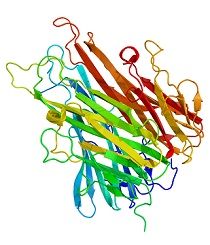Article
Which Anti-TNF Treatment Works Best in Patients with Psoriatic Arthritis?
Does the research show any significant difference between anti-tumor necrosis factor drugs in terms of their effectiveness for treating psoriatic arthritis?

In patients with psoriatic arthritis, first-line treatment often consists of NSAIDs such as ibuprofen and naproxen. Patients who do not respond to treatment with NSAIDs may benefit from treatment with disease modifying anti-rheumatic drugs (DMARDs) such as methotrexate, sulfasalazine, and leflunomide.
Patients who do not respond to either of these approaches may be candidates for treatment with anti-tumor necrosis factor (anti-TNF) agents, including adalimumab, golimumab, etanercept, and infliximab. However, the American College of Rheumatology notes that “antiâ€TNF treatment is expensive and not without side effects, including an increased risk for serious infections, especially tuberculosis. Therefore, it should not be used without an initial trial of an NSAID. Those with arthritis in the knees, ankles, elbows, wrists, hands and feet also should try DMARD therapy prior to anti-TNF treatment.”
These potential side effects and safety issues should factor into the decision when selecting an anti-TNF agent for use in treatment. One recent study looked at the safety profiles of these medications in an attempt to discern whether one drug presented a more favorable option for patients. In “Safety of Anti-TNFα Agents in the Treatment of Psoriasis and Psoriatic Arthritis,” published in Immunopharmacology and Immunotoxicology, the authors looked at current evidence on the safety of anti-TNF agents in the treatment of patients with psoriasis and psoriatic arthritis (PsA). They wrote that the “available data on the safety of anti-TNFα agents such as etanercept in psoriasis and PsA appear reassuring, even if some concerns still exist. Most notably, data suggest a higher incidence of infection and lymphoma amongst patients treated with the anti-TNFα monoclonal antibodies infliximab and adalimumab compared with etanercept.”
Thus, they concluded that “the overall safety profile of monoclonal antibodies in patients with psoriasis, PsA and RA seems less favorable than that of etanercept, particularly in terms of risk of infection and hepatotoxicity.”
Efficacy is the other key factor during medication selection in patients with psoriatic arthritis. However, the data may not be much help here, as several studies have found conflicting evidence when it comes to treatment efficacy in this population. One study published in 2010 in Rheumatology looked at outcomes using etanercept, infliximab, and adalimumab in a cohort of patients from the British Society for Rheumatology Biologics Register. The authors reported that there were no significant differences between the three anti-TNF therapies in European League against Rheumatism (EULAR) improvement criteria response rates at 6, 12, and 18 months of treatment.
Analysis of the data showed that 30.9%, 37.3%, and 36.5% of patients in the etanercept group achieved disease remission at 6, 12, and 18 months, respectively. For the infliximab group, the numbers were 19.7%, 28.9%, and 29.6%, while for the adalimumab group the numbers were 30.1%, 45.1%, and 41.5%.
A different study, published in Clinical Rheumatology, performed an indirect comparison of adalimumab, etanercept, and infliximab by looking at data from previously published clinical trials. Based on this data, the authors concluded that etancercept would be expected to provide the greatest American College of Rheumatology (ACR) 20 response, compared with placebo.
Another study found that treatment efficacy varied depending on which measure was used. The authors reported that patients with psoriatic arthritis who were treated with infliximab and adalimumab showed the greatest improvement as measured by the Psoriasis Area and Severity Index, while patients who were treated with etanercept showed greater improvement based on tender joints count and the health assessment questionnaire.
Finally, researchers in Canada recently looked at the comparative effectiveness of anti-TNF agents in patients with psoriatic arthritis who had not achieved an adequate response to prior DMARD treatment, measuring “relative risks (RR) for the psoriatic arthritis response criteria (PsARC), mean differences (MDs) for improvements from baseline for the Health Assessment Questionnaire (HAQ) by PsARC responders and non-responders, and MD for the improvements from baseline for the psoriasis area and severity index (PASI).”
They reported their results in “Anti-Tumor Necrosis Factor (TNF) Drugs for the Treatment of Psoriatic Arthritis: An Indirect Comparison Meta-Analysis,” published in Biologics: Targets and Therapy.
The authors analyzed data from seven randomized clinical trials and two health technology assessments. Based on response to PsARC, “golimumab yielded the highest RR and etanercept the second highest; adalimumab and infliximab both yielded notably smaller RRs.” Measured by HAQ improvement, “etanercept and infliximab yielded the largest MD among PsARC responders. For PsARC nonresponders, etanercept, infliximab, and golimumab yielded similar MDs, and adalimumab a notably lower MD.” Measured by PASI improvement, “infliximab yielded the largest MD and golimumab the second largest, while etanercept yielded the smallest MD.”
These conflicting findings led the authors to conclude that “All anti-TNFs were significantly better than control, but the indirect comparison did not reveal any statistically significant difference between the anti-TNFs.”
Related Coverage:
Study Endorses Early TNF Use in Psoriasis Patients
Is Rheumatoid Arthritis Really on the Decline?
Adalimumab Biosimilar Meets Primary Endpoint in Rheumatoid Arthritis Trial




